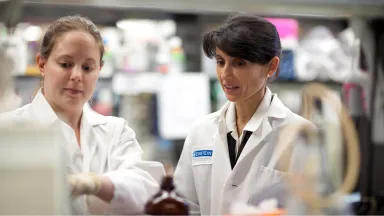
Satish K. Nandakumar, M.B.,B.S., Ph.D.
- Assistant Professor, Department of Cell Biology
Area of research
- Germline predisposition to blood cancers, Hematopoietic stem cells, Clonal hematopoiesis, Myeloproliferative neoplasms, Genetic variants, Enhancer elements, CRISPR/Cas9 edited stem cell models, Multiplexed functional assays.
Phone
Location
- Albert Einstein College of Medicine Jack and Pearl Resnick Campus 1300 Morris Park Avenue Chanin Building 413 Bronx, NY 10461
Research Profiles
Professional Interests
Genetics of hematopoietic stem cell (HSC) clonal dynamics and leukemia predisposition
Every day, each one of us produce hundreds of billions of specialized blood cells through a process of hematopoietic differentiation originating from a pool of long-lived hematopoietic stem cells (HSCs). As we age, some HSCs acquire mutations that causes them and their progeny to expand resulting in the formation of their own distinct “clones”. This condition known as clonal hematopoiesis is ubiquitous with advancing age affecting 10%-20% of population by the age of 70 years. Individuals with clonal hematopoiesis have an increased risk hematological malignancies such as leukemia and myelodysplastic syndromes. If we could identify and prevent such clones from expanding this can dramatically reduce risk for blood cancers. Despite its importance, we still don’t understand why these clones emerge only in some individuals and why only a small subset of such carriers’ eventually progresses to cancer?
Our laboratory leverages human genetic studies such as genome-wide association studies (GWAS) and studies on rare families to address these questions. Our goal is to identify and experimentally study germline risk variants that predispose individuals to clonal hematopoiesis and myeloid malignancies. Our recent work has uncovered a previously unappreciated mechanism by which inherited genetic variants influence clonal blood disorders by modulation of HSC function and self-renewal (Bao et al., Nature 2020; Bick et al., Nature 2020).
We routinely model genetic risk variants into primary human hematopoietic stem and progenitor cells using CRISPR/Cas9 approaches and study their impact on stem cell function and clonal expansion of mutant HSCs. We are developing engineered mouse models to study mechanisms of blood cancer predisposition. Since the majority of these genetic variants are in noncoding genomic regions, we are employing high throughput approaches that we have developed to systematically test their effects on transcriptional activity (Ulirsch et al., Cell 2016). Our studies will provide critical insights into how germline variants influence the emergence of clonal hematopoiesis and its progression to hematological malignancies.
Research Directions
1. Mechanisms of germline predisposition to clonal hematopoiesis and leukemia.
2. Investigation of the role of interactions between germline and somatic variants in shaping hematopoietic stem cell clonal fitness.
3. Genome engineering of human normal, preleukemic and leukemic hematopoietic stem and progenitor cells using CRISPR/Cas9.
4. Application of multiplexed functional assays and genetic screens to prioritize germline genetic variants underlying clonal blood disorders.
Selected Publications
Bao EL*, Nandakumar SK*, Liao X, Bick AG, Karjalainen J, Tabaka M, et al. Inherited myeloproliferative neoplasm risk affects haematopoietic stem cells. Nature. 2020;586(7831):769-75. Epub 20201014. doi: 10.1038/s41586-020-2786-7. PubMed PMID: 33057200; PubMed Central PMCID: PMC7606745. [* denotes equal contribution]
Bick AG*, Weinstock JS*, Nandakumar SK, Fulco CP, Bao EL, Zekavat SM, et al. Inherited causes of clonal haematopoiesis in 97,691 whole genomes. Nature. 2020;586(7831):763-8. Epub 20201014. doi: 10.1038/s41586-020-2819-2. PubMed PMID: 33057201; PubMed Central PMCID: PMC7944936.
Nandakumar SK, Liao X, Sankaran VG. In The Blood: Connecting Variant to Function In Human Hematopoiesis. Trends Genet. 2020;36(8):563-76. Epub 20200610. doi: 10.1016/j.tig.2020.05.006. PubMed PMID: 32534791; PubMed Central PMCID: PMC7363574.
Nandakumar SK, McFarland SK, Mateyka LM, Lareau CA, Ulirsch JC, Ludwig LS, et al. Gene-centric functional dissection of human genetic variation uncovers regulators of hematopoiesis. Elife. 2019;8. Epub 20190509. doi: 10.7554/eLife.44080. PubMed PMID: 31070582; PubMed Central PMCID: PMC6534380.
Guo MH*, Nandakumar SK*, Ulirsch JC, Zekavat SM, Buenrostro JD, Natarajan P, et al. Comprehensive population-based genome sequencing provides insight into hematopoietic regulatory mechanisms. Proc Natl Acad Sci U S A. 2017;114(3):E327-E36. Epub 20161228. doi: 10.1073/pnas.1619052114. PubMed PMID: 28031487; PubMed Central PMCID: PMC5255587. [* denotes equal contribution]
Ulirsch JC*, Nandakumar SK*, Wang L, Giani FC, Zhang X, Rogov P, et al. Systematic Functional Dissection of Common Genetic Variation Affecting Red Blood Cell Traits. Cell. 2016;165(6):1530-45. doi: 10.1016/j.cell.2016.04.048. PubMed PMID: 27259154; PubMed Central PMCID: PMC4893171. [* denotes equal contribution]
Nandakumar SK*, Ulirsch JC*, Sankaran VG. Advances in understanding erythropoiesis: evolving perspectives. Br J Haematol. 2016;173(2):206-18. Epub 20160205. doi: 10.1111/bjh.13938. PubMed PMID: 26846448; PubMed Central PMCID: PMC4833665. [* denotes equal contribution]
Nandakumar SK, Johnson K, Throm SL, Pestina TI, Neale G, Persons DA. Low-level GATA2 overexpression promotes myeloid progenitor self-renewal and blocks lymphoid differentiation in mice. Exp Hematol. 2015;43(7):565-77 e1-10. Epub 20150420. doi: 10.1016/j.exphem.2015.04.002. PubMed PMID: 25907033.





